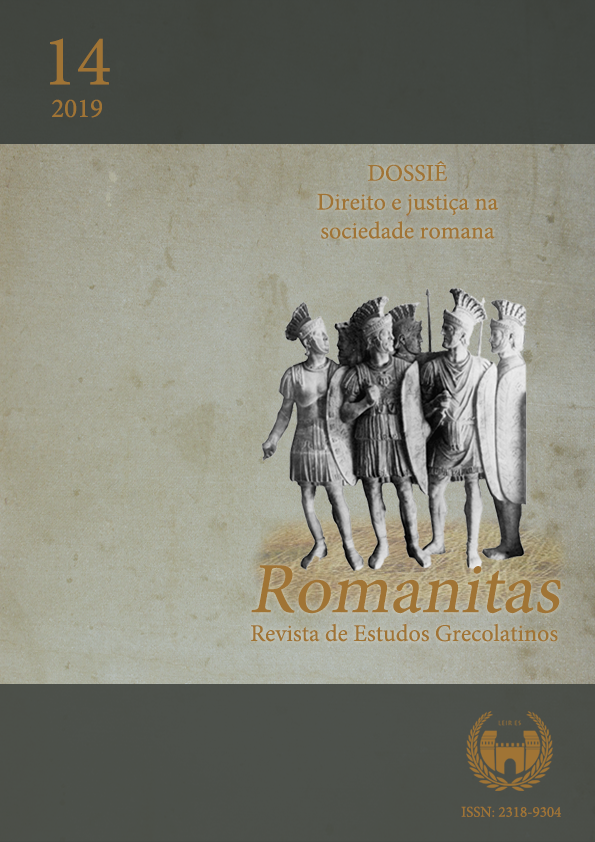The ‘Justinian Code’ and the strategies of the imperial power
DOI:
https://doi.org/10.17648/rom.v0i14.28896Keywords:
Corpus Iuris Civilis, Roman Law, JustinianAbstract
Justinian assumed power in 527 AD and ruled the Eastern Roman Empire until 565. His military actions are known mainly through the actions of generals Belisario and Narses in North Africa and the Italian Peninsula. The emperor also undertook a laborious legal project, publishing a set of books - Codex, Digesto, Institutiones and Novellae - later called Corpus Iuris Civilis, through which many specialists investigate Roman law. The purpose of this article is to discuss the legal production of the emperor as a mechanism of power and political strategy of government.
Downloads
References
Documentação textual
AGAPETO. Advice to the emperor Justinian. In. BELL, P. N. Three poltitical voices from the Age of Justinian. Liverpool: University Press, 2009, p. 99-122.
ALIGHIERI, D. A divina comédia. São Paulo: Editora 34, 1998.
CORIPO. Juánide. Panegírico de Justino II. Introducciones, traducción y notas de Ana Ramírez Tirado. Madrid: Gredos, 1997.
JOHN MALALAS. Chronicle. Translated by Elizabeth Jeffreys, Michael Jeffreys and Roger Scott. Melbourne: Australian Association for Byzantine Studies, 1986.
JUSTINIAN. Institutiones. Translated by Peter Birks and Grant McLeod. New York: Cornell University, 1987.
JUSTINIAN. Corpus Juris Civilis. Translated by S. P. Scott. Cincinnati: Central Trust Company, 1932.
PAULO THE SILENTIARY. Description of the Church of Hagia Sophia. In. BELL, P. N. Three political voices from the Age of Justinian. Liverpool: Liverpool University Press, 2009, p. 189-212.
PROCOPIUS. History of the war. Translated by H. B. Dewing. Cambridge: Harvard University Press, 2006.
PROCOPIUS. Buildings. Translated by H. B. Dewing. Cambridge: Harvard University Press, 1996.
PROCOPIUS. Secret History. Translated by H. B. Dewing. Cambridge: Harvard University Press, 1935.
Obras de apoio
ARENDT, H. O que é política. Rio de Janeiro: Bertrand Brasil, 1999.
BIRKS, P.; MCLEOD, G. Introduction. In: JUSTINIAN. Justinian´s Institutes. New York: Cornell University Press, 1987.
BURNS, J. H. The Cambridge history of medieval political thought (350-1450). Cambridge: Cambridge University Press, 1988.
CORCORAN, S. The nouus codex and the codex repetitae praelectionis: Justinian and his codes. In. BENOIST, S.; DAGUET-GAGEY, A.; CAUWENBERGHE, C. H.-van (Ed.). Figures d´Empire, fragments de mémoire: pouvoirs et identités dans le monde romain imperial, IIe s. av. n. è. – VIe s. de n. è. Villeneuve d´Ascq: Presses Universitaires du Septentrion, 2011, p. 425-444.
EVANS, J. A. The emperor Justinian and the Byzantine Empire. London: Greenwood Press, 2005.
GIBBON, E. The history of the decline and fall of the Roman Empire. London: Joseph Ogle Robinson, 1830.
HARRIES, J. Law and Empire in Late Antiquity. Cambridge: Cambridge University Press, 2004.
HUMFRESS, C. Law and legal practice in the age of Justinian. In. MAAS, M. (Ed.). The Cambridge Companion to the Age of Justinian. Cambridge: Cambridge University Press, 2005, p. 161-184.
KALDELLIS, A. Procopius of Caesarea: tyranny, history and philosophy at the end of Antiquity. Philadelphia: University of Pennsylvania Press, 2004.
KUTTNER, S. The revival of jurisprudence. In. BENSON, R.L.; CONSTABLE, G. (Ed.). Renaissance and Renewal in the Twelfth Century. Cambridge: Harvard University Press, 1982, p. 299-323.
LIEBS, D. Roman law. In. CAMERON, A.; WARD-PERKINS, B.; WHITBY, M. (Ed.). The Cambridge Ancient History: Late Antiquity, empire and successors, A.D. 425-600. Cambridge: Cambridge University Press, 2008, p. 238-259.
MAAS, M. John Lydus and the Roman past: antiquarianism and politics in the age of Justinian. London: Routledge, 1992.
METZER, E. (Ed.). A companion to Justinian´s Institutes. London: Duckworth, 1998.
MOUSOURAKIS, G. A legal History of Rome. London: Routledge, 2007.
NACATA JUNIOR, E. K. O programa de estudos de Justiniano para as escolas de Direito do Império Bizantino. Revista Faculdade de Direito da Univiversidade de São Paulo, v. 106/107, p. 677‑719, 2011/2012.
RADDING, C. M.; CIARALLI, A. The Corpus Iuris Civilis in the Middle Ages: manuscripts and transmission from the sixth century to the juristic revival. Leiden: Brill, 2007.
SCHELTEMA, H. J. L’enseignement de droit des antécesseurs. Leiden: Brill, 1970.
SCHIPANI, S.; ARAUJO, D. B. dos S. G. (Org.). Sistema jurídico romanístico e subsistema jurídico latino-americano. São Paulo: FGV, 2015.
STEIN, P. Roman Law in European History. New York: Cambridge University Press, 1999.
STEIN, P. The development of the institutional system. In: STEIN, P. G.; LEWIS, A. D. E. (Ed.). Studies in Justinian´s Institutes in memory of J. A. C. Thomas. London: Sweet & Maxwell, 1983, p. 151-163.
STOLTE, B. Justice: legal literature. In: JEFFREYS, E.; HALDON, J.F.; CORMACK, R. (Ed.). The Oxford Handbook of Byzantine Studies. Oxford: University Press, 2008, p. 691‑698.
TAKÁCS, S. A., The construction of authority in Ancient Rome and Byzantium: the rhetoric of Empire. Cambridge: Cambridge University Press, 2009.
VARGAS VALENCIA, A. Principios de derechos humanos en las Instituciones de Justiniano. In. CERQUEIRA, F. et al. Saberes e poderes no Mundo Antigo: estudos ibero-latinos-americanos. Coimbra: Imprensa da Universidade de Coimbra, 2013, p. 117- 128.
WEBER, M. Economia y sociedade. México: Fondo de cultura econômica, 1996.
Downloads
Published
Issue
Section
License

This work is licensed under a Creative Commons Attribution-NonCommercial-NoDerivatives 4.0 International License.
a. The authors retain copyright and grant the journal the right to first publication.
b. The authors are authorized to assume additional contracts separately, for non-exclusive distribution of the version of the work published in this journal (e.g., publishing in institutional repository or as a book chapter), with acknowledgment of authorship and initial publication in this journal.
c. Authors are allowed and encouraged to publish and distribute their work online (e.g. in institutional repositories or on their personal page) after the first publication by the journal, with due credit.
d. The journal's texts are licensed under a CC BY 4.0 Deed Attribution 4.0 International Licence (CC BY).




























